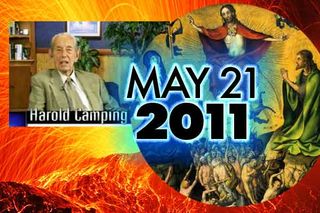Mark Your Calendars: End of World Coming Oct. 21, Camping Says

The radio preacher who predicted Judgment Day on May 21 has not backed down from his claims that the end of the world is near, despite the lack of a Rapture or world-devastating earthquakes leading up to the doomsday.
In an announcement on his Family Radio Network website, Harold Camping stands by his earlier predictions that the world will end on Friday, Oct. 21. Originally, Camping had predicted hourly earthquakes and God's judgment on May 21, to be followed by months of torment on Earth for those individuals left behind. Using numerical codes extracted from the Bible, Camping set the date for the end of everything for Oct. 21.
[Read: Understanding the 10 Most Destructive Human Behaviors]
When May 21 came and went without fanfare, Camping revised his story. The "earthquakes" he had predicted did occur, he writes on his website in a post titled "What Happened on May 21?" — only instead of shaking the Earth, God shook mankind "with fear." Likewise, although no one was raptured, God is no longer saving souls, Camping writes.
"What really happened this past May 21st?" Camping wrote. "What really happened is that God accomplished exactly what He wanted to happen."
Camping, who suffered a stroke in June and is now at home recuperating, also said in an audio message on his site that the end on Oct. 21 will come quietly.
It's not unusual for failed doomsday predictors to claim that their prophecies were true, just slightly misunderstood. [Read: 10 Failed Doomsday Predictions]
Sign up for the Live Science daily newsletter now
Get the world’s most fascinating discoveries delivered straight to your inbox.
"Most often, the answer given by the group is that the prophecy is true, but the interpretation was wrong," Concordia University professor of religion Lorenzo DiTommaso told LiveScience during Camping's rush of publicity in May.
The modern Seventh-Day Adventist church, for example, got its start as a splinter group of Baptist preacher William Miller, who predicted the end of the world on Oct. 22, 1844. In the post-doomsday letdown, Miller's followers struggled to explain what went wrong. The group that would become the Seventh-Day Adventists concluded that on that day, Jesus had shifted his location in heaven in preparation to return to Earth.
Other groups have also survived failed predictions of Armageddon. The Jehovah's Witnesses made specific predictions about the apocalypse until the early 1990s, when they switched to more vague prophecies. A 1950s doomsday cult known as The Seekers actually bragged to the media after their end-of-the-world prediction failed, saying that their devotion had saved humanity.
Believing in the end of the world even without evidence may seem strange, but sociologists say that a belief in doomsday gives followers a clear sense of the world and their place in it. Others have suggested that apocalyptic worldviews stem from the overwhelming feeling that one's problems are too big, and, as such, the only possible solution is a clean slate. Over the past 40 to 50 years these doomsday beliefs have increased, according to DiTommaso, though not all "believers" are as extreme as Camping. [Read: The Draw of Doomsday: Why We Look Forward to the End]
Camping's doomsday prediction isn't the only looming end-of-the-world forecast this month. Apocalyptic rumors circulating online have held that the comet Elenin is set to collide with Earth or to cause some sort of celestial domino effect that would result in the end of the world. Debris from Elenin — which started breaking up after a solar storm in August — will pass within 22 million miles (35.4 million kilometers) of Earth on Sunday (Oct. 16), and astronomers say that the comet is not remotely dangerous to Earthlings.
You can follow LiveScience senior writer Stephanie Pappas on Twitter @sipappas. Follow LiveScience for the latest in science news and discoveries on Twitter @livescience and on Facebook.

Stephanie Pappas is a contributing writer for Live Science, covering topics ranging from geoscience to archaeology to the human brain and behavior. She was previously a senior writer for Live Science but is now a freelancer based in Denver, Colorado, and regularly contributes to Scientific American and The Monitor, the monthly magazine of the American Psychological Association. Stephanie received a bachelor's degree in psychology from the University of South Carolina and a graduate certificate in science communication from the University of California, Santa Cruz.